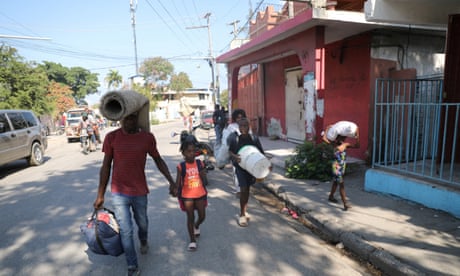Embattled Haitian prime minister Ariel Henry has issued his resignation, the president of Guyana, Irfaan Ali, announced on Monday, after a gang insurrection against the government.
“We acknowledge the resignation of prime minister Ariel Henry upon the establishment of a transitional presidential council and the naming of an interim prime minister,” Ali said from a regional summit in Kingston, Jamaica.
In a video address, Henry, who is in Puerto Rico and unable to return to Haiti, urged people to remain calm until a transition of power could be arranged.
“The government that I am leading will resign immediately after the installation of [a transition] council,” Henry said. “I want to thank the Haitian people for the opportunity I had been granted.
“I’m asking all Haitians to remain calm and do everything they can for peace and stability to come back as fast as possible.”
Videos distributed on Haitian social media appeared to show celebrations in the street, with people dancing to music in a party atmosphere and fireworks launched into the night sky.
Henry’s resignation comes after gangs joined forces to oust the unelected leader during 10 days of chaos in which they set police stations on fire, stormed ports and prisons and laid siege to the capital’s international airport.

A senior US official said Henry remains in Puerto Rico, and that the decision for him to step down was made on Friday. Henry expressed a desire to return to Haiti in the future, the official said.
Henry submitted his resignation to the Caribbean Community regional political bloc, Caricom, after they held an emergency meeting on Haiti’s future as it edged ever closer to a failed state.
Ariel Henry became Haiti’s acting leader in July 2021 when Colombian mercenaries assassinated the country’s president, Jovenel Moise.
Henry’s government was widely viewed as corrupt and also illegitimate because it repeatedly failed to hold elections. Haiti has not had an election since 2016.
Under the 74-year-old’s rule, gangs seized control of much of the country and regularly terrorised civilians, cutting off food and fuel supplies and blocking roads. Armed criminals now control 80% of the capital, Port Au Prince. Nearly half the population – or 4.35 million Haitians – regularly go hungry.
Henry had tried to secure a UN-backed taskforce of foreign troops to bolster the country’s police and shore up order since October 2022. On 1 March, he finally got Kenya to sign an agreement to send 1,000 officers to the Caribbean.
The pledge came too late, however. While Henry was in Nairobi, armed gangs –who normally fight one another for territory – came together to push Henry from power, promising “genocide” if he did not step down.
By paralysing Haiti’s airport and unleashing an unprecedented wave of violence on the streets of Port Au Prince, the armed criminals forced Henry to watch his government collapse from abroad.
Henry’s interim successor will be appointed by a presidential council with two observers and seven voting members, Ali said. The council’s representatives will come from the private sector, civil society and include one religious leader.
Anyone who intends to run in Haiti’s next elections will not be able to participate, Ali added.









































